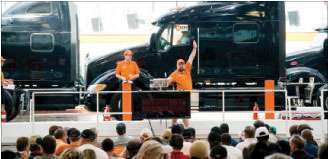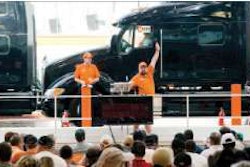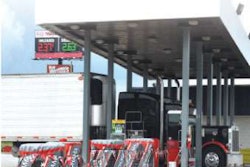They’re still not widely used by owner-operators, but auctions offer some advantages over traditional means of trading equipment.
 A Ritchie Bros. representative takes a bid during an auction in Fort Worth, Texas.
A Ritchie Bros. representative takes a bid during an auction in Fort Worth, Texas.One can be price. “It’s somewhere between wholesale and retail,” says Paul Wachter, president of Taylor & Martin. “Without a question, you’re going to save money by buying at a sale. That’s always been the draw.”
At two leading truck auctioneers, equipment has no minimum or reserve, so you even have an outside chance of a bargain-basement steal. An owner-operator bidder has an advantage over dealers because a dealer has to leave room for a markup to make a profit.
Age of the trucks varies quite a bit, says Dean Siddle, vice president of transportation sales for Ritchie Bros. Auctioneers. Often, new trucks come from dealers or end users who over-ordered and had to accept delivery, he says.
At an Oct. 25 auction near Tunica, Miss., a Peterbilt 379 Legacy Class Edition (a premium, final-run version of the classic truck) with 18,000 miles went for $115,000, Wachter says.
Auction companies provide no warranties of their own, but they do verify whether existing engine warranties can be passed on.
If you’re interested in a truck but need more information in advance than the sales listing, you can ask the auction staff to check certain things. For more detailed inspection, you can make arrangements with a local mechanic.

You also can arrange for remote proxy bidding. “We have somebody we know and trust act as their representative in the crowd, to bid and know where to stop,” Wachter says. Ritchie Bros. also offers live online bidding, which accounts for almost one in five sales.
The buyer mix usually is 80 percent end users, most of them not single-truck owner-operators, and the rest dealers and brokers, Siddle says. “We attract a large crowd – 2,000 and 3,000 at most sales,” he says. “Additionally, 300 to 400 people bid on the Internet.”
The seller profile varies a lot as well, Wachter says, “from an individual upgrading his truck, maybe selling it in the sale and buying a later model, all the way to large fleets.”
Selling at auction
1 Contact the sale office at least 30 days before the auction to make sure your equipment is listed in the print version of the inventory.
2 A sales representative will examine your equipment, give you an anticipated sales value, explain costs associated with selling and advise you on suggested repairs or detailing.
3 Be prepared to deliver your equipment anywhere from three days to three weeks before the sale, depending on the auctioneer.
Buying at auction
1 After determining the auction you plan to attend, order the brochure for that event or study the inventory online.
2 Establish your financing: a check with a bank’s guarantee, a wire transfer, a cashier’s check or, in the case of Ritchie Bros., on-site financing through CitiCapital.
3 Show up early enough at the auction to inspect equipment and register for a bid number.
Resources
Ritchie Bros. Auctioneers
https://www.rbauction.com/truck-auctions, (800) 211-3983
Taylor & Martin
https://www.taylorandmartin.com/ (800) 654-8280 n








